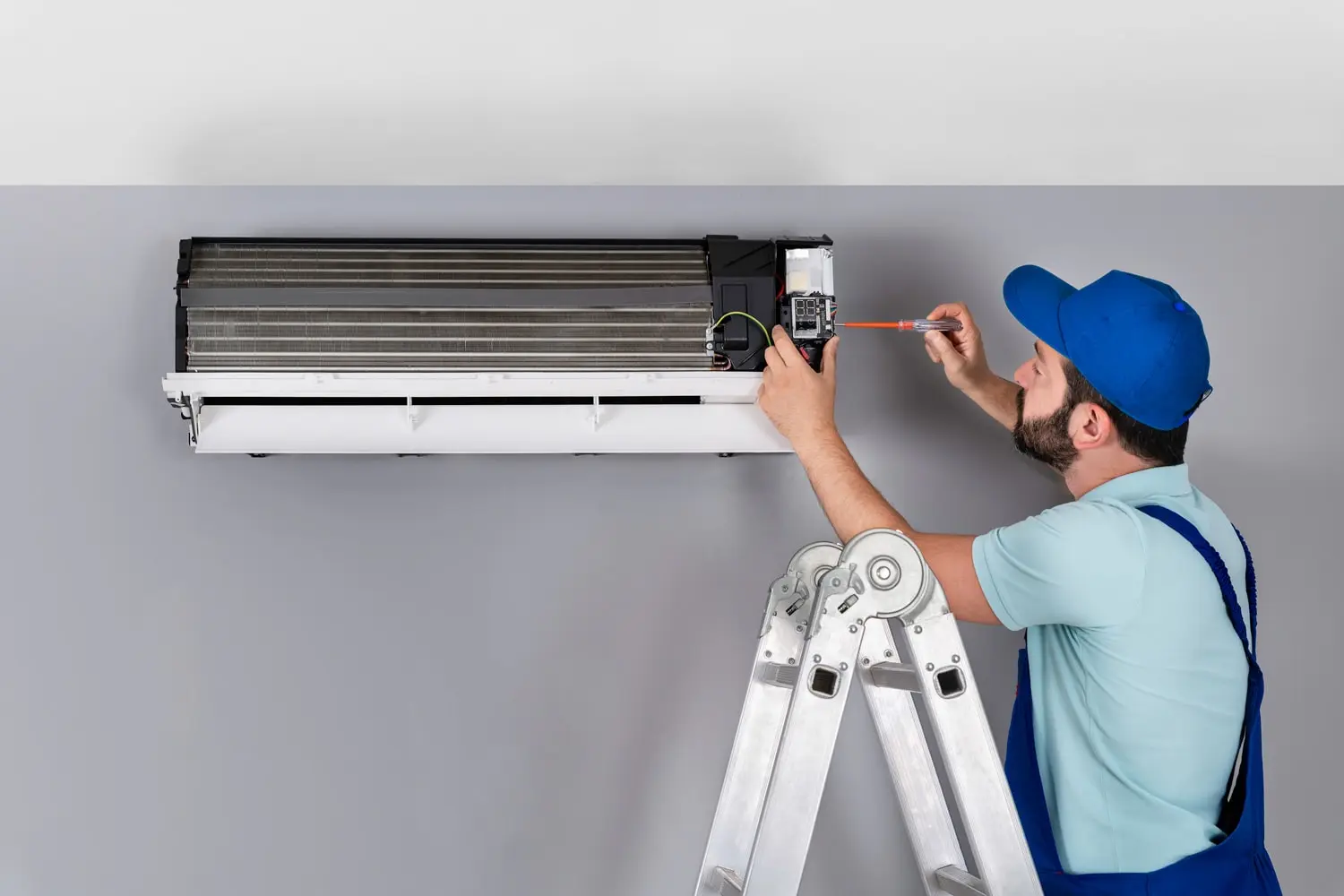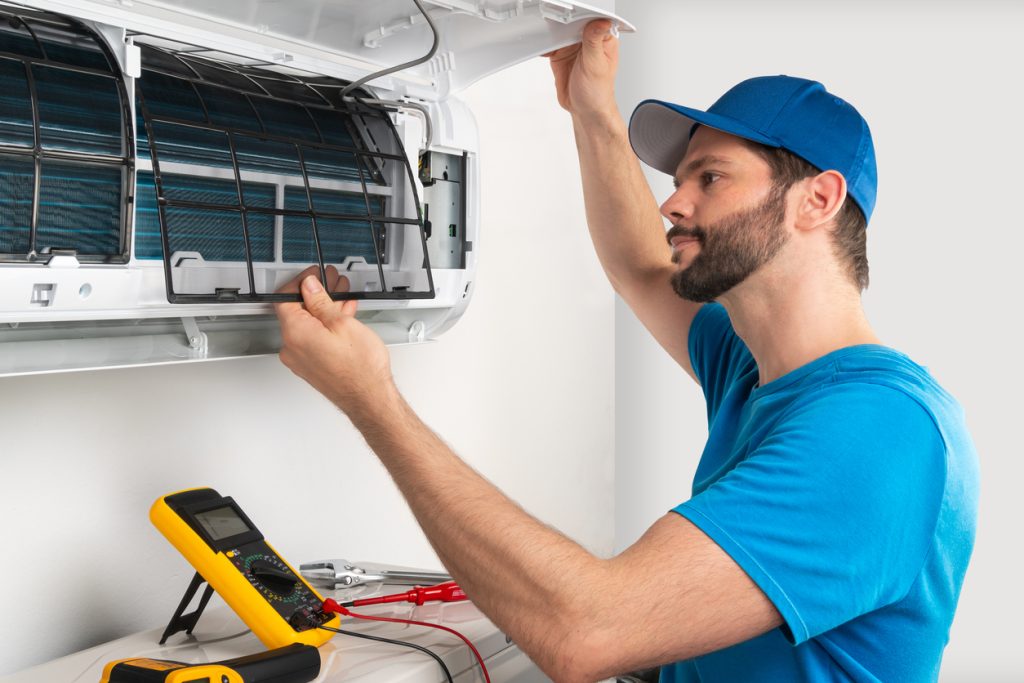7 Simple Techniques For Ac Air Conditioner Repair
7 Simple Techniques For Ac Air Conditioner Repair
Blog Article
The Basic Principles Of Air Conditioning Repair
AC Repair: Professional Cooling System Restoration Ensures Your Home Stays Comfortable All Year Round
Types of A/c Systems
When dealing with air conditioner repair, understanding the type of a/c system you're handling can conserve time, money, and aggravation. Ever wondered why some systems cool a space much faster than others? Or why certain systems appear to break down more regularly? Let's peel back the layers.
Central Air Conditioning
Some Ideas on Ac Fixing You Need To Know
Think of a cool breeze check here flowing through a whole house, whispering comfort into every corner. Central air systems do exactly that. They utilize a network of ducts to disperse cooled air, counting on a compressor and condenser outside, matched with an evaporator coil inside. But when this complex beast falters, identifying the concern can be like finding a needle in a haystack.
Split Systems

Split systems are a popular option for numerous homes-- part indoor system, part outdoor compressor. They offer flexibility and performance, however their dual nature implies repair work can involve either part. Have you ever heard a strange noise outside your home just to find the indoor system isn't cooling? That's a timeless indication of a split system glitch.
Everything about Fix Air Conditioner
Window Units
These compact warriors battle summertime heat by fitting snugly into a window frame. They integrate all elements into a single box. Their simpleness often means fewer repair work headaches, but disregarding filters or enabling debris buildup can result in decreased efficiency or breakdowns.
Ductless Mini-Splits
The Facts About Air Conditioning Repair Near Me Revealed
Ductless systems bypass ductwork entirely, making them ideal for homes without existing ventilation. They're peaceful, effective, and remarkably resistant. Yet, when repairs are required, professionals need to be proficient at dealing with refrigerant lines and electrical connections-- no little accomplishment.
Quick Recommendation Table
| Type | Secret Features | Typical Repair Work Issues |
|---|---|---|
| Central Air | Ductwork, whole-house cooling | Duct leakages, compressor failure |
| Split System | Indoor & & outside systems | Refrigerant leaks, fan motor problems |
| Window Unit | All-in-one, easy installation | Filthy filters, electrical faults |
| Ductless Mini-Split | No ducts, zoned cooling | Line leaks, sensor breakdowns |
Fascination About Ac Repair Near Me
Unraveling one of the most Regular Air Conditioner Issues
Have you ever wondered why your a/c unit suddenly stops cooling during a sweltering afternoon? One common culprit is a dirty or stopped up air filter. This tricky villain limits airflow, forcing your system to work overtime, which not only lowers performance however can also cause premature breakdowns. Imagine trying to breathe through a headscarf soaked in dust-- it's tiring!
Another frequent hiccup is refrigerant leakages. These undetectable leakages don't just reduce cooling power however can likewise damage the compressor, the heart of your a/c system. How often do you look for unusual hissing noises or ice formation on the coils? Capturing these indications early can conserve you from expensive repairs down the line.
Beyond the Fundamentals: Lesser-Known Issues
The Best Guide To Ac Repair
Often, the thermostat itself is the mischief-maker. Miscalibrated or defective thermostats send combined signals, triggering the air conditioner to cycle erratically. Ever experienced your air conditioner turning on and off in rapid succession? That's called brief cycling, a tricky effectiveness drainer that can wear components much faster than you 'd anticipate.
Electrical problems, such as worn wiring or a malfunctioning capacitor, might prowl underneath the surface area. Repair Air Conditioner Near Me. These typically manifest as a/c units failing to begin or suddenly shutting down. A professional eye understands to check these components with accuracy tools, something a casual look will not reveal
Specialist Tips for Diagnosing Common Air Conditioner Problems
Not known Details About Air Conditioning Repair Near Me
- Examine and change air filters regularly-- every 1 to 3 months depending upon use and environment.
- Listen for uncommon sounds like rattling or buzzing that could indicate loose parts or electrical faults.
- Examine the outdoor unit for debris or clogs that impede airflow and cause getting too hot.
- Search for frost accumulation on evaporator coils, a tip towards refrigerant issues or airflow constraints.
- Test the thermostat settings and recalibrate if the temperature level readings feel off.
Quick Reference Table: Manifestation & & Probable Causes

| Sign | Probable Cause | Specialist Suggestion |
|---|---|---|
| Warm air blowing | Low refrigerant or filthy coils | Tidy coils and look for leaks instantly |
| Short biking | Thermostat concerns or large system | Adjust thermostat settings and consult sizing standards |
| System won't start | Electrical faults or capacitor failure | Test circuitry and change capacitors as required |
| Water leak | Blocked drain line or frozen evaporator | Clear drain lines and examine for coil icing |
DO IT YOURSELF Air Conditioner Maintenance Tips
Air Conditioner Repair Near Me - The Facts
Ever seen your a/c sputtering like an old engine on a hot summertime day? Overlooking subtle indications frequently indicates more than simply a sweaty afternoon-- it's a prelude to unanticipated air conditioner repair costs. However what if you could catch those whispers before they become wails? Routine do it yourself upkeep can be your very first line of defense.
Simple Steps to Keep Your A/c Running Smoothly
10 Easy Facts About Ac Repair Near Me Explained
- Clean or Replace Filters: A clogged up filter is like trying to breathe through a headscarf. Every 1-3 months, check and swap out your filters. It enhances airflow and effectiveness, avoiding compressor pressure.
- Check the Condenser Coils: Dust and debris function as unnoticeable blankets smothering your system's cooling power. Gently brush or vacuum the coils, but prevent severe chemicals that may deteriorate the metal.
- Examine the Drain Line: When was the last time you glanced at your drain pan? A clogged up drain can trigger water leaks and foster mold growth. Flushing it with a vinegar service regular monthly keeps the flow clear.
- Seal and Insulate: Are your ductworks whispering leaks? Sealing gaps with mastic or foil tape increases performance and minimize unequal cooling.
Pro Tips Beyond the Fundamentals
- Procedure your system's voltage to capture subtle electrical wear before it triggers huge problems.
- Listen for unusual hums or rattles-- these acoustic breadcrumbs often signal loose parts or stopping working motors.
- Keep outdoor systems shaded however make sure a minimum of two feet of clearance around them for ideal airflow.
Ask yourself: Are you hearing your air conditioner's peaceful SOS or simply waiting on it to scream? Taking time for DO IT YOURSELF AC maintenance transforms reactive repair into proactive care, conserving sweat, stress, and yes, cash.
The Greatest Guide To Repair Air Conditioner Near Me
Why Expertise in Air Conditioner Repair Matters
Imagine this: your AC system sputters and groans throughout a scorching afternoon, leaving you sweltering inside your home. Would you trust a newbie fumbling with fragile elements, or would you look for the peace of mind of a professional AC service technician!.?.!? The intricacies of contemporary a/c systems require accuracy and experience. A small miscalculation can escalate a small breakdown into an expensive catastrophe.
10 Easy Facts About Ac Fixing Described
Unseen Intricacies Behind the Cool Breeze
Lots of ignore the layers hidden beneath the streamlined outside of an air conditioner system - Repair Air Conditioner Near Me. From refrigerant leakages that calmly drain pipes efficiency to malfunctioning thermostats that misread temperature levels, these issues require more than a fundamental toolkit. Specialists have an eager eye for detecting problems that average property owners neglect
Vital Tips for Selecting the Right Service Technician
Ac Repair - The Facts
- Certification and Training: Confirm qualifications; a specialist trained in the most recent heating and cooling innovations is important.
- Experience with Specific Systems: Not all air conditioner systems are developed equivalent; discover somebody acquainted with your model's peculiarities.
- Diagnostic Method: Skilled specialists utilize sophisticated tools-- like electronic leak detectors and thermal imaging-- to determine covert faults.
What to Expect from a Pro's Diagnostic Process
| Action | Purpose | Specialist Insight |
|---|---|---|
| Visual Assessment | Identify apparent wear or damage | Search for corrosion or uncommon noises-- an indicator often neglected |
| Pressure Checking | Find refrigerant leakages | Subtle pressure drops can hint at micro leaks unnoticeable to the naked eye |
| Electrical Evaluating | Guarantee circuit stability | Loose connections can simulate extreme mechanical failures |
The 15-Second Trick For Air Conditioning Repair Near Me
Why DIY Frequently Falls Short
Appealing as it is to tinker with your a/c unit, do it yourself fixes often miss out on the root cause. For example, complementing refrigerant might temporarily cool your area but overlooks leaks that get worse with time. Professional specialists do not just patch symptoms; they hound the underlying mechanical and electrical faults that sap efficiency.
What Does Repair Air Conditioner Near Me Do?
Questions to Ask Before Employing
- What diagnostic tools do you utilize to identify concerns?
- Can you describe the repair work procedure and expected outcomes?
- Are you knowledgeable about the refrigerants compatible with my system?
- Do you follow safety protocols for dealing with electrical parts?